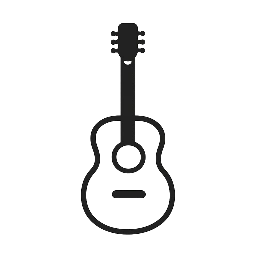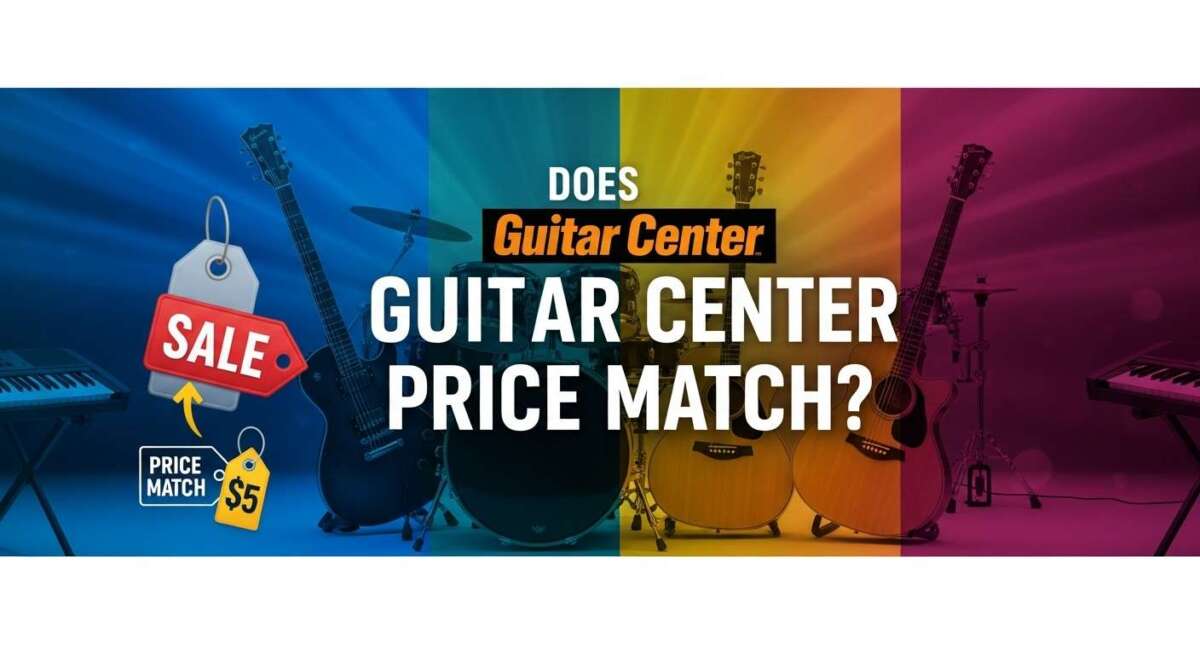Are you wondering if Guitar Center will match a lower price you found elsewhere? If you’re planning to buy a guitar, amp, or other gear, knowing the answer can save you money and hassle.
Price matching can be tricky, with rules that vary from store to store. But what about Guitar Center? Does this popular music retailer offer price matching, and if so, how does it work? Keep reading to find out everything you need to know to get the best deal on your next musical purchase.

Credit: stores.guitarcenter.com
Guitar Center Price Match Policy
Guitar Center offers a price match policy to help customers get the best deal. This policy allows shoppers to request a lower price if they find the same product elsewhere for less. Understanding the details can save you money on your next purchase.
Eligibility Criteria
To qualify for price matching, the product must be new and in stock. The request must be made before the purchase is completed. Customers need to provide proof of the lower price from the competitor. Price matching is available only for identical items, not bundles or used products.
Items Covered
The policy covers most musical instruments and gear sold by Guitar Center. This includes guitars, amplifiers, pedals, and accessories. Some items like clearance or special sale products may not be eligible. Check with the store for specific exclusions before asking for a price match.
Competitor Requirements
The competitor must be an authorized retailer with a physical or online store. The lower price must be current and not a limited-time offer. The competitor’s item should be the same brand, model, and color. Guitar Center does not match prices from marketplaces like eBay or auction sites.
How To Request A Price Match
Requesting a price match at Guitar Center is a simple process. You need to follow certain steps to ensure your request is accepted. This guide explains how to ask for a price match effectively.
Gathering Proof
First, find the product with the lower price. Make sure the item is the same brand, model, and color. Take a clear photo or screenshot of the lower price. Include the store name and the date in your proof.
Contacting Customer Service
Next, reach out to Guitar Center’s customer service. You can call, email, or visit a store in person. Provide your proof of the lower price. Explain politely that you want to request a price match.
Timing And Deadlines
Price match requests must be made within a set time period. Usually, this is within 30 days of purchase. Check Guitar Center’s policy for exact details. Act quickly to avoid missing the deadline.
Benefits Of Price Matching At Guitar Center
Price matching at Guitar Center offers several advantages for musicians and gear enthusiasts. It helps shoppers get the best prices without hunting multiple stores. Customers enjoy confidence knowing they pay a fair rate on quality instruments and accessories.
This policy makes buying gear simpler and more budget-friendly. It encourages trust and loyalty among buyers. Below are key benefits that show why price matching matters at Guitar Center.
Saving Money On Gear
Price matching ensures you never overpay for your favorite instruments. It lets you buy at the lowest available price. This saves cash that you can use on more gear or lessons. You avoid the hassle of returning items found cheaper elsewhere.
Access To Competitive Deals
Guitar Center’s price match opens access to deals from other stores. You can shop with confidence knowing you get competitive offers. This helps you find the best gear at great prices. It keeps Guitar Center competitive and customer-focused.
Enhanced Shopping Experience
Price matching creates a smooth and stress-free shopping journey. You spend less time comparing prices across many shops. The process gives peace of mind and clear value. Customers often return because they trust the fairness of pricing.
Limitations And Exclusions
Guitar Center offers price matching but with specific limits. Understanding these limits helps avoid confusion. Not all products or situations qualify for a price match. Knowing the exceptions saves time and effort.
Products Not Eligible
Some items do not qualify for price matching. Used gear is often excluded. Gift cards and special orders usually don’t qualify. Clearance and open-box products may be ineligible. These rules help Guitar Center manage pricing fairly.
Exclusions On Sale Or Clearance Items
Sale items often have special pricing rules. Guitar Center usually excludes clearance products from price matching. Discounts from coupons or promotions might not count. Temporary sales or limited-time offers are also often excluded. These exclusions protect store profit margins.
Online Vs In-store Policies
Guitar Center’s price match rules can differ between online and physical stores. Some online prices may not be matched in-store. Online competitors’ prices might have different restrictions. Customers should check specific policy details before requesting a match. Knowing the difference avoids surprises.
Price Matching Vs Other Discounts
Price matching is a popular way to save money at Guitar Center. It ensures you get the best price by matching a competitor’s offer. Other discounts like coupons and loyalty programs also lower prices. Understanding how price matching compares to these discounts helps you save more. Below, we explore key points about combining price matching with other savings.
Coupon And Promo Code Compatibility
Guitar Center usually does not allow price matching with coupons or promo codes. These discounts work separately. You can use a coupon on a regular price or a price-matched item, but not both at once. This means you must choose the best deal for your purchase. Always check the terms of the coupon before buying.
Membership And Loyalty Discounts
Members of Guitar Center’s loyalty program get special discounts and points. These offers often apply even if you use price matching. Loyalty discounts can stack with price matches, making your purchase cheaper. Signing up for the program is free and easy. Take advantage of member-only sales and rewards to save more.
Combining Offers
Combining price matching with other discounts has limits. Price matching usually cannot be combined with other sales or promotions. Loyalty discounts are an exception in many cases. Always ask the store staff about combining deals. Knowing the store’s policy helps avoid surprises at checkout. Use the best option to get the lowest price available.
Tips For Maximizing Savings
Maximizing savings at Guitar Center means using smart strategies. Understanding price match rules helps you save more. Combine timing and research to get the best deals.
Here are practical tips to stretch your budget and buy gear without overspending.
Monitoring Competitor Prices
Keep an eye on prices at other music stores and online shops. Check websites daily for discounts and sales. Note down prices and dates for your records. This info helps when you ask for a price match. Accurate details make the process faster and easier.
Timing Your Purchases
Shop during sales events like Black Friday or holiday promotions. Prices often drop, increasing your chances to save. Avoid buying just before major sales. Waiting can mean better deals and price match opportunities. Early in the week may also have lower prices than weekends.
Using Price Match Strategically
Use price match only for identical products with the same model and color. Bring proof like screenshots or ads showing the lower price. Ask politely and clearly to increase success. Combine price match with store coupons or rewards for extra discounts. Check Guitar Center’s policies to avoid surprises.
Common Questions About Price Matching
Price matching is a popular way for customers to get the best deal at Guitar Center. Many buyers have questions about how this policy works. Understanding the details helps shoppers save money and shop with confidence.
Below, we answer some common questions about Guitar Center’s price matching policy. This includes information about online purchases, how often you can request a match, and what proof you need to provide.
Can You Price Match Online Purchases?
Yes, Guitar Center does allow price matching for online purchases. The lower price must come from a qualifying retailer. The product should be the same brand, model, and color. Prices from auction sites or marketplace sellers often do not qualify.
It is important to provide a valid link or screenshot showing the lower price. The item must be in stock at the competitor’s site. This helps Guitar Center verify the offer quickly.
How Often Can You Request A Match?
You can request a price match each time you buy a product, but only once per item. Guitar Center does not allow multiple matches on the same purchase. This policy prevents abuse and keeps the process fair for all customers.
If the price drops shortly after your purchase, some stores offer a price adjustment within a limited time. Check Guitar Center’s specific policy to see if they allow this.
What Proof Is Accepted?
Guitar Center requires clear proof of the lower price. This usually means a website link or a printed advertisement. The proof must show the product, price, and date clearly. It must come from a legitimate competitor.
Photos of competitor’s tags or receipts may also work. Emails or promotional codes can be accepted if they meet the policy rules. Always have your proof ready at the time of purchase to speed up the process.
The ‘forbidden Riff’ In Guitar Stores
The “Forbidden Riff” is a well-known joke among guitar players and store staff. It refers to certain songs that are played too often in music stores. These riffs are usually simple, popular, and heavily overused. Playing them loudly and repeatedly can annoy employees and other customers.
Guitar Center and many other music stores often experience this issue. Staff sometimes ask players to avoid these riffs out of respect. This unspoken rule helps keep the store environment pleasant for everyone.
Origin Of The Forbidden Riff
The idea of the forbidden riff started with musicians and store workers frustrated by repeated songs. It gained popularity after a famous scene in the movie Wayne’s World. In that scene, a character is stopped from playing the opening notes of “Stairway to Heaven.”
This moment captured the annoyance many feel when hearing the same riff again and again. Since then, the term has spread through music communities worldwide. It reminds guitarists to try new songs or play quietly when testing instruments.
Why ‘stairway To Heaven’ Is Banned
“Stairway to Heaven” is the most famous forbidden riff. It is easy to recognize and often played by beginners. Many players try it first when testing guitars. This causes store staff to hear it repeatedly all day.
The song’s popularity and overuse led to its unofficial ban in many stores. Employees ask customers not to play it to avoid noise complaints and irritation. This rule helps keep the store calm and friendly for everyone.
Other Overplayed Riffs
Besides “Stairway to Heaven,” several riffs are often banned or discouraged. Some common examples include “Smoke on the Water,” “Sweet Child O’ Mine,” and “Iron Man.”
These riffs are easy to learn and very popular among beginners. Playing them repeatedly in stores makes employees tired and customers less comfortable. Avoiding these helps create a better experience for all visitors.
Etiquette For Trying Instruments
Trying instruments at a music store like Guitar Center is exciting. It helps you find the perfect guitar or gear. Following proper etiquette makes the experience good for everyone. It shows respect to staff and other customers. It also keeps the store environment pleasant and welcoming.
Volume And Song Choice
Keep the volume low while testing instruments. Loud sounds can disturb others. Avoid playing very fast or loud riffs. Choose simple songs or scales instead. This helps you hear the instrument’s true tone. It also prevents annoying other customers and employees.
Respecting Staff And Customers
Staff work hard to assist all customers. Be polite and patient with them. Ask for permission before trying special or rare instruments. Avoid blocking aisles or sitting on the floor. Remember, other shoppers want to try instruments too. Your respect makes the store a better place.
Alternatives To Popular Riffs
Avoid playing popular, overused riffs like “Stairway to Heaven.” These tunes are often called “forbidden riffs.” Employees hear them many times daily. Instead, try less common songs or simple melodies. This shows good manners and keeps the atmosphere fresh. It also helps you focus on the instrument, not the song.

Credit: www.reddit.com

Credit: www.reddit.com
Frequently Asked Questions
Why Does Guitar Center Have A Forbidden List?
Guitar Center has a forbidden list to prevent repetitive, overplayed songs that annoy staff and customers. It promotes respect and a better store experience.
What Is The Price Matching Rule?
The price matching rule guarantees customers the lowest price by matching competitors’ identical product prices. Customers must provide proof and meet specific conditions. Retailers verify details like product model and price validity before applying the match. This ensures fair pricing and customer satisfaction.
Can You Ask For A Price Match?
Yes, you can ask for a price match by showing proof of a lower price on the same product from a competitor. The retailer will verify and may match the price if conditions apply. Always check the store’s price match policy before requesting.
What Is The Forbidden Song At Guitar Center?
The forbidden song at Guitar Center is Led Zeppelin’s “Stairway to Heaven. ” It’s overplayed by beginners testing guitars. Employees find it repetitive and annoying, so customers avoid it as a courtesy. This unofficial ban stems from a cultural joke about the song’s constant presence in music stores.
Conclusion
Guitar Center offers price matching on many items, but rules apply. You must show a lower price from a qualified competitor. The product must be the same brand, model, and color. Some exclusions and conditions may affect eligibility. Always check Guitar Center’s current policy before buying.
This can help you save money and shop confidently. Understanding price match details keeps your purchase smart and fair. Keep proof of the lower price ready to make the process smooth. Price matching adds value but requires clear steps to follow.

Senior Music Reviewer
Alex Carter is a seasoned music reviewer with over a decade of experience in the world of sound and instruments. Passionate about helping musicians and enthusiasts make informed choices, he brings sharp insights and in-depth knowledge to every review. From classical instruments to modern gear, Alex combines technical expertise with a love for music to deliver content that resonates with readers.
As a Senior Music Reviewer and expert author on Tuneluma.com, Alex is dedicated to sharing honest evaluations, practical advice, and thoughtful commentary to guide readers in their musical journey.


Leave a Reply